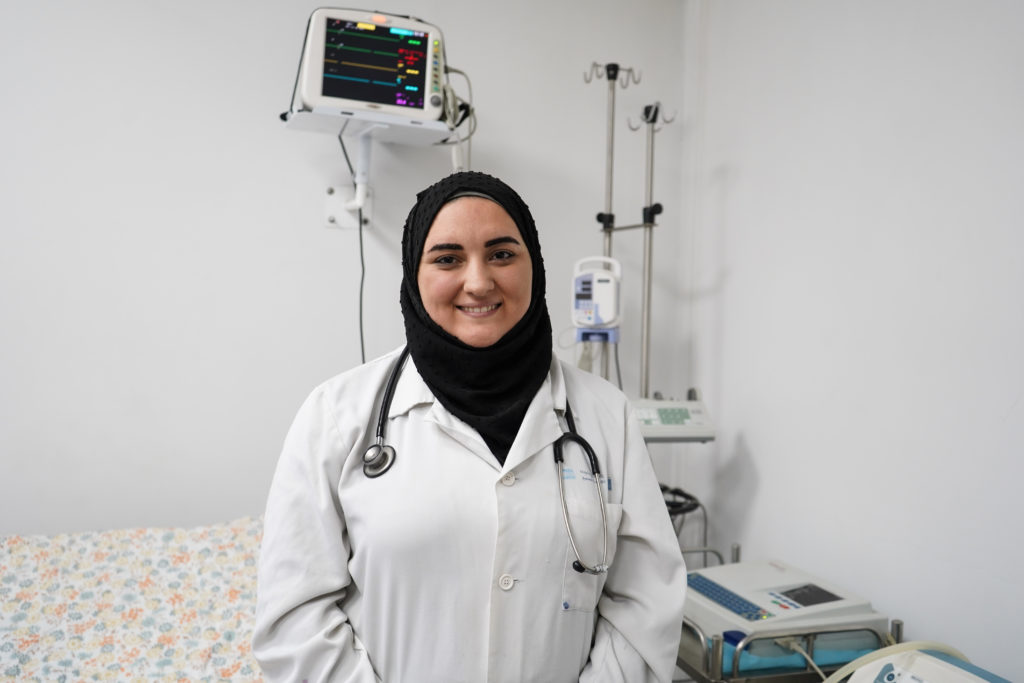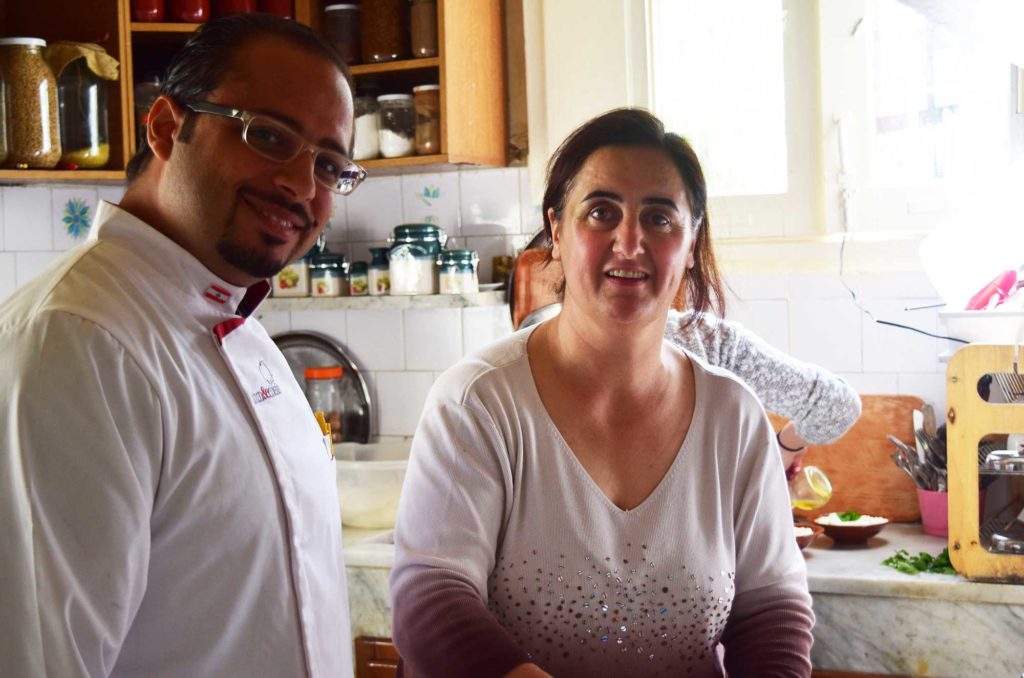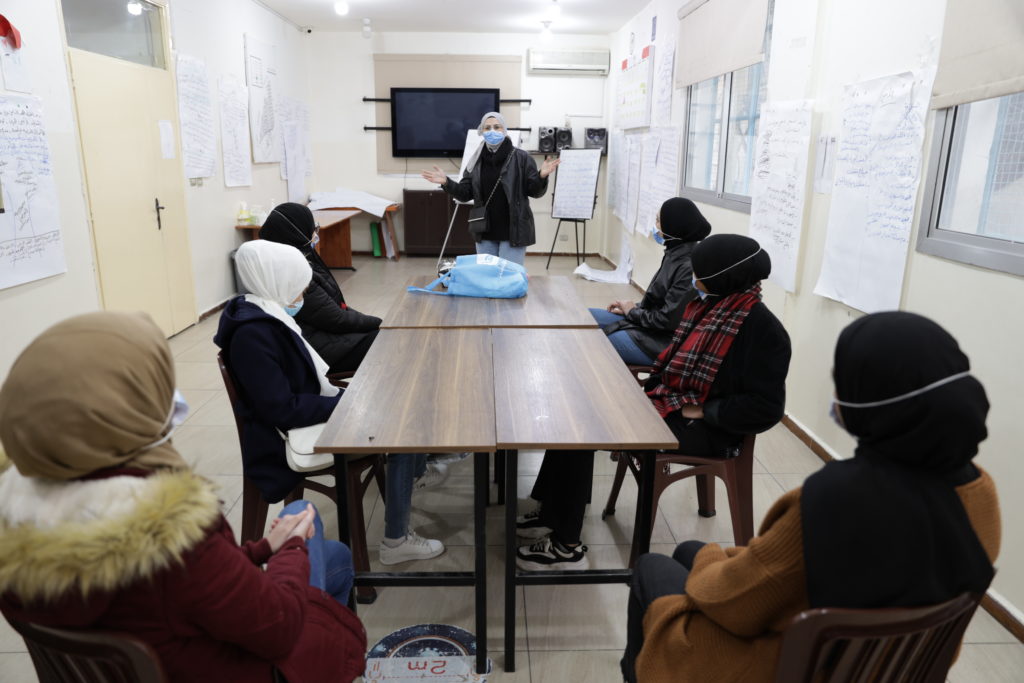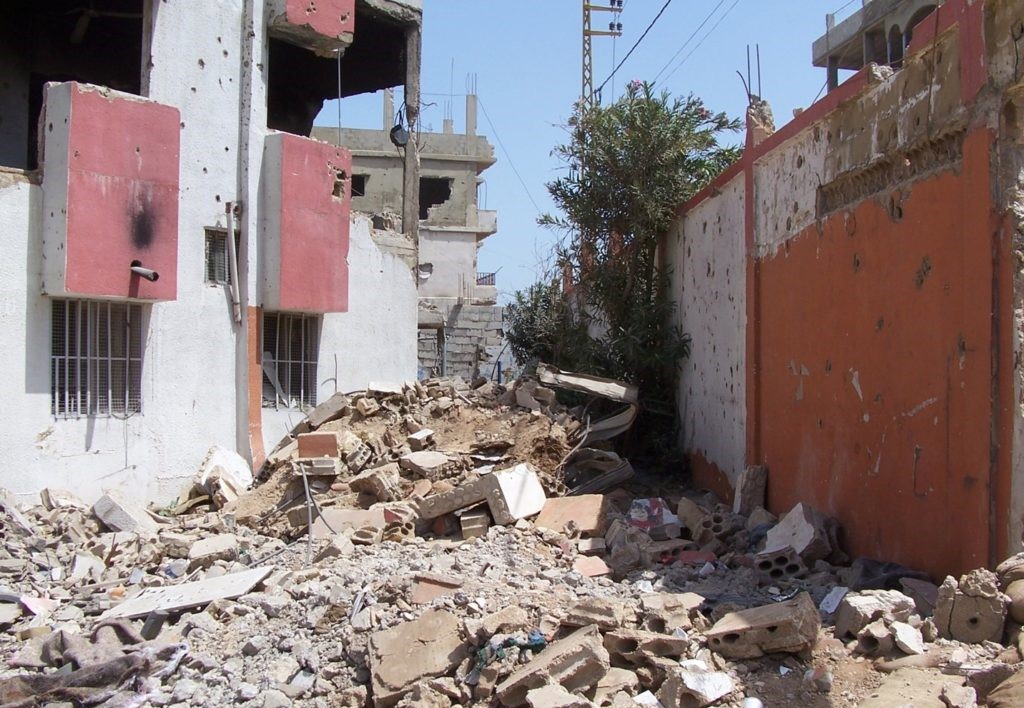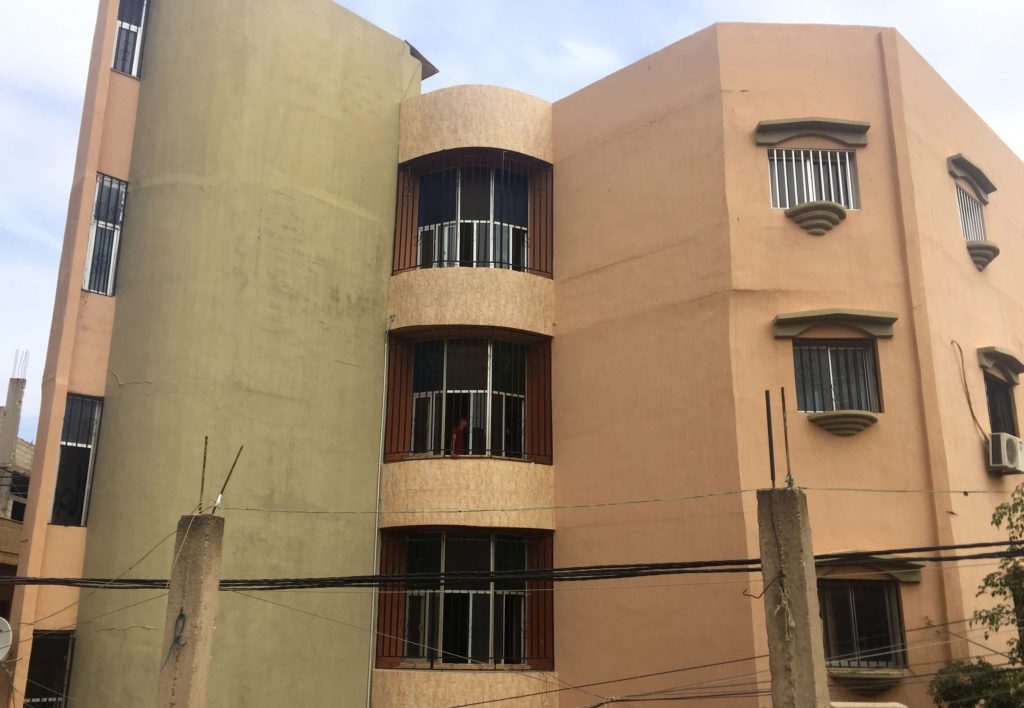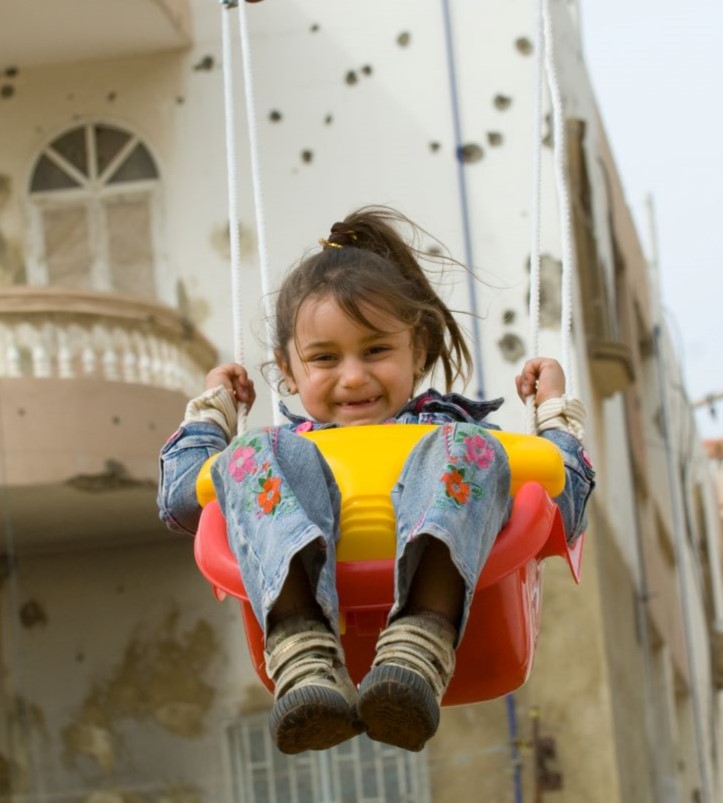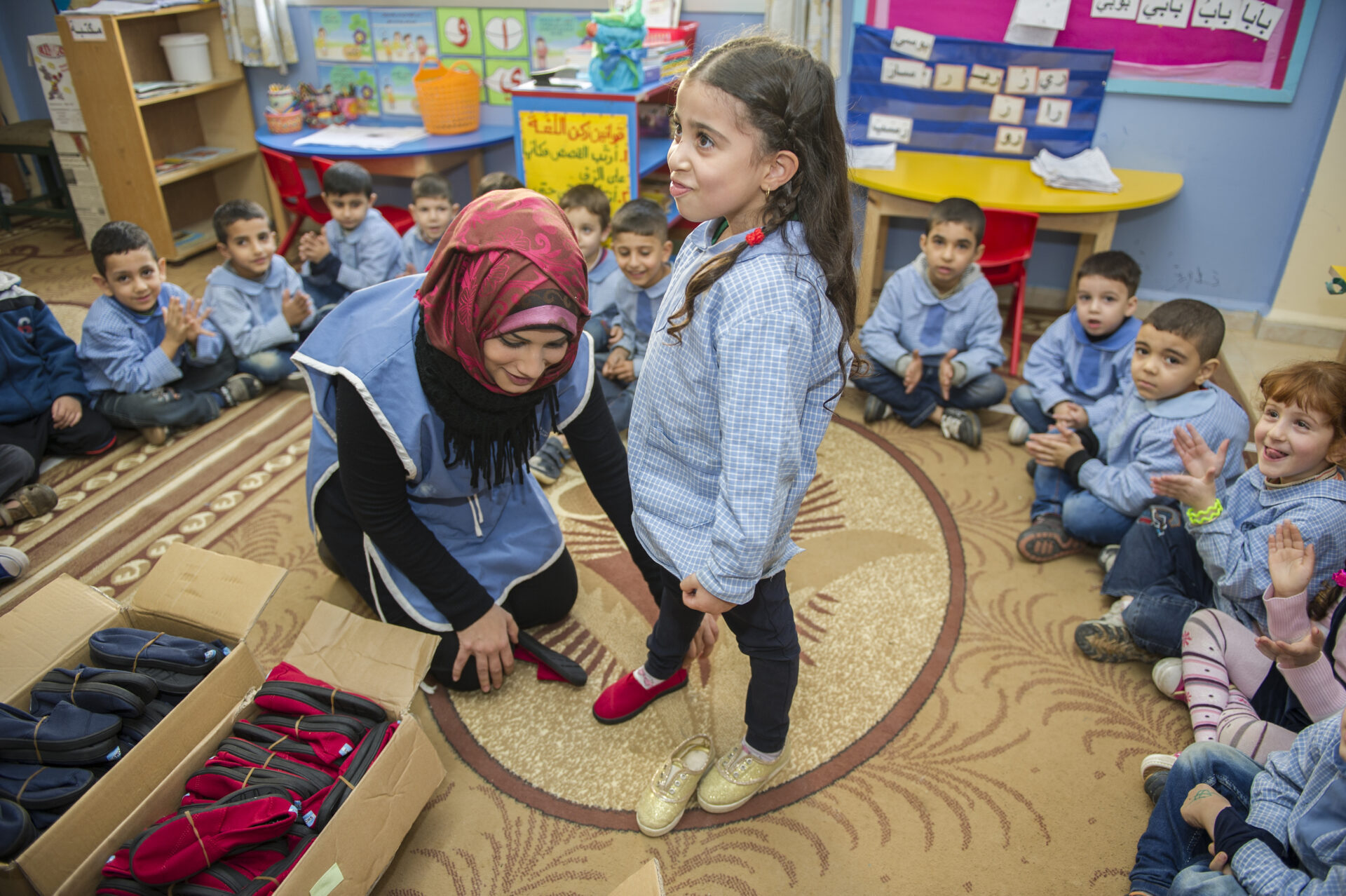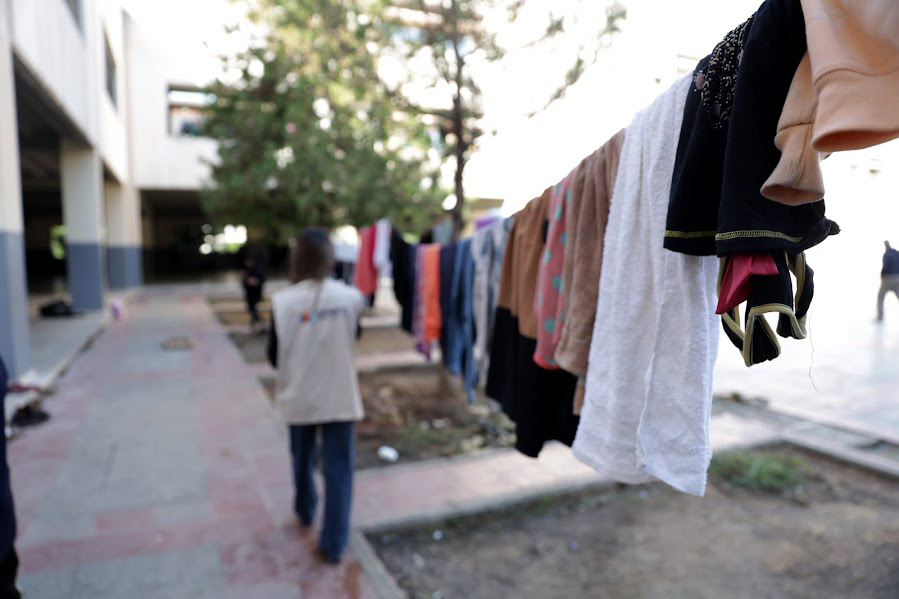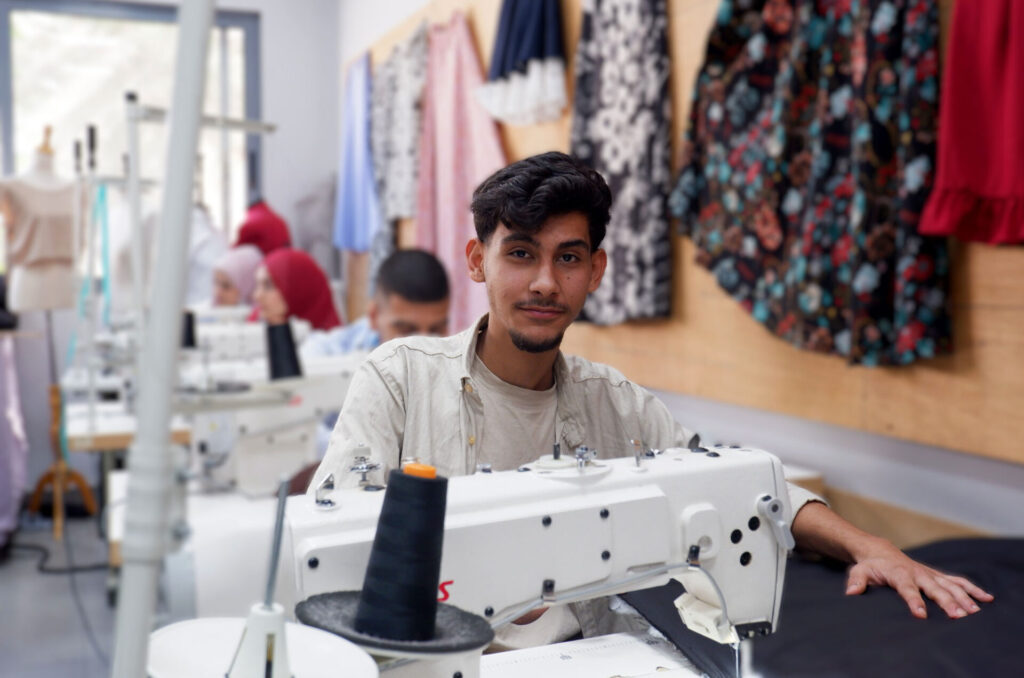Apr, 2023
The North Lebanon governorate is home to over 700,000 people, including thousands of Syrian and Palestinian refugees and Lebanon’s second largest city, Tripoli.
North Lebanon Governorate | محافظة الشمال
The North Lebanon governorate was created in 2003, in an administrative designation separating it from the Akkar governorate. The North Governorate is home to more than 700,000 people, including Syrian and Palestinian refugees, with a diverse population of people of many faiths. The governorate’s terrain ranges widely, from beaches near the regional capital of Tripoli to the western mountains in the Bsharri district. Due to the Syrian crisis, the governorate saw an influx of 250,000 Syrian refugees entering the area, which added to the already large population of Palestinian refugees.
Two major Palestinian refugee camps, Nahr El Bared and Beddawi, are in the North Governorate.
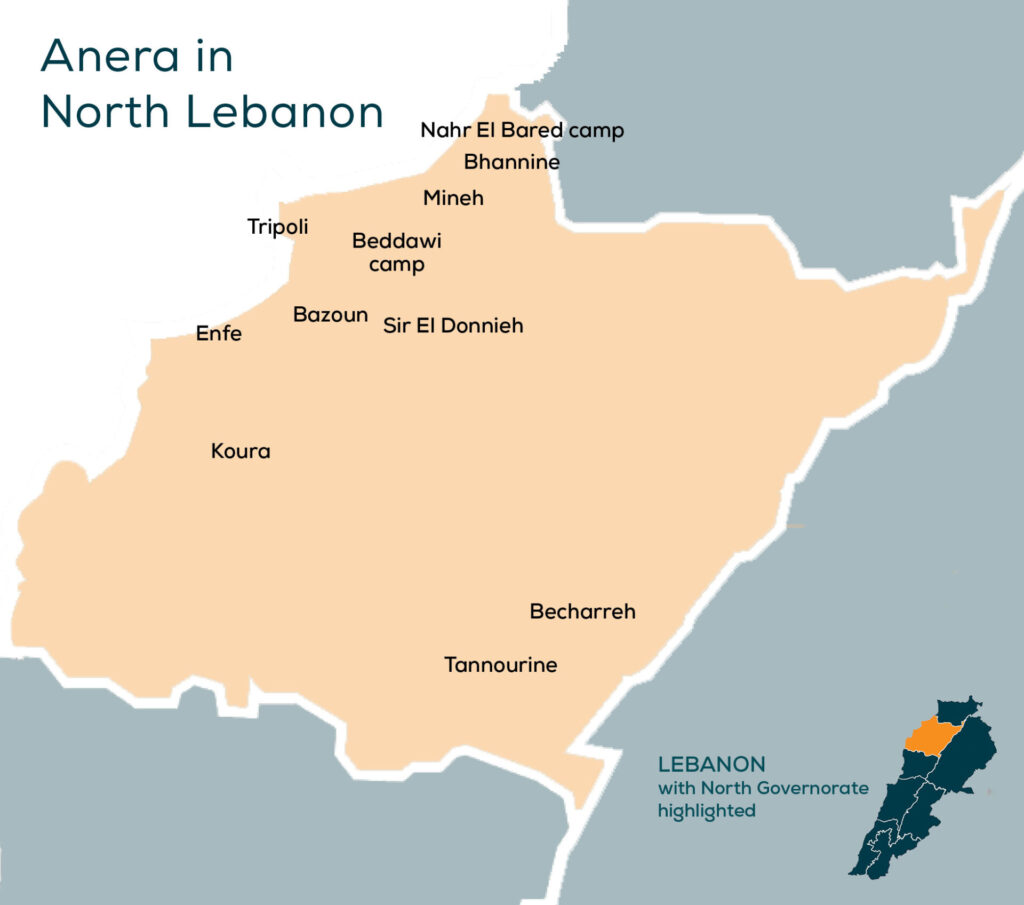

Education in North Lebanon
Basic Education and Vocational Training
Anera has delivered non-formal education and vocational training in the North Governorate since 2014. In partnership with local nonprofits, Anera helps out-of-school children and youths enter school by teaching them basic literacy and math skills and empowering them with life skills activities. Our trainings help youth improve basic reading, writing, math, and IT skills as cornerstones for their employability and further education, reaching Syrians, Palestinians and Lebanese living throughout Lebanon.
Anera’s vocational training programs in the North Governorate focus on providing youth with valuable, transferable skills applicable to careers that are available in the market. We offer diverse courses, ranging from construction and management to agriculture and sewing. Following a competency-based training approach, the classes take into account the abilities of the targeted youth, as well as potential employment opportunities within the Lebanese job market. To effectively implement these programs, Anera trains vocational teachers and supervisors and rehabilitates vocational training centers.
For example, in 2012, Anera provided 25 vocational training teachers and supervisors with the financial support to buy materials and cover part of their training costs, as well as capacity building workshops and coaching sessions. The initiative impacted more than 150 students in Palestinian refugee camps in the North Lebanon governorate, providing their vocational training providers with the materials and knowledge to carry out their education.
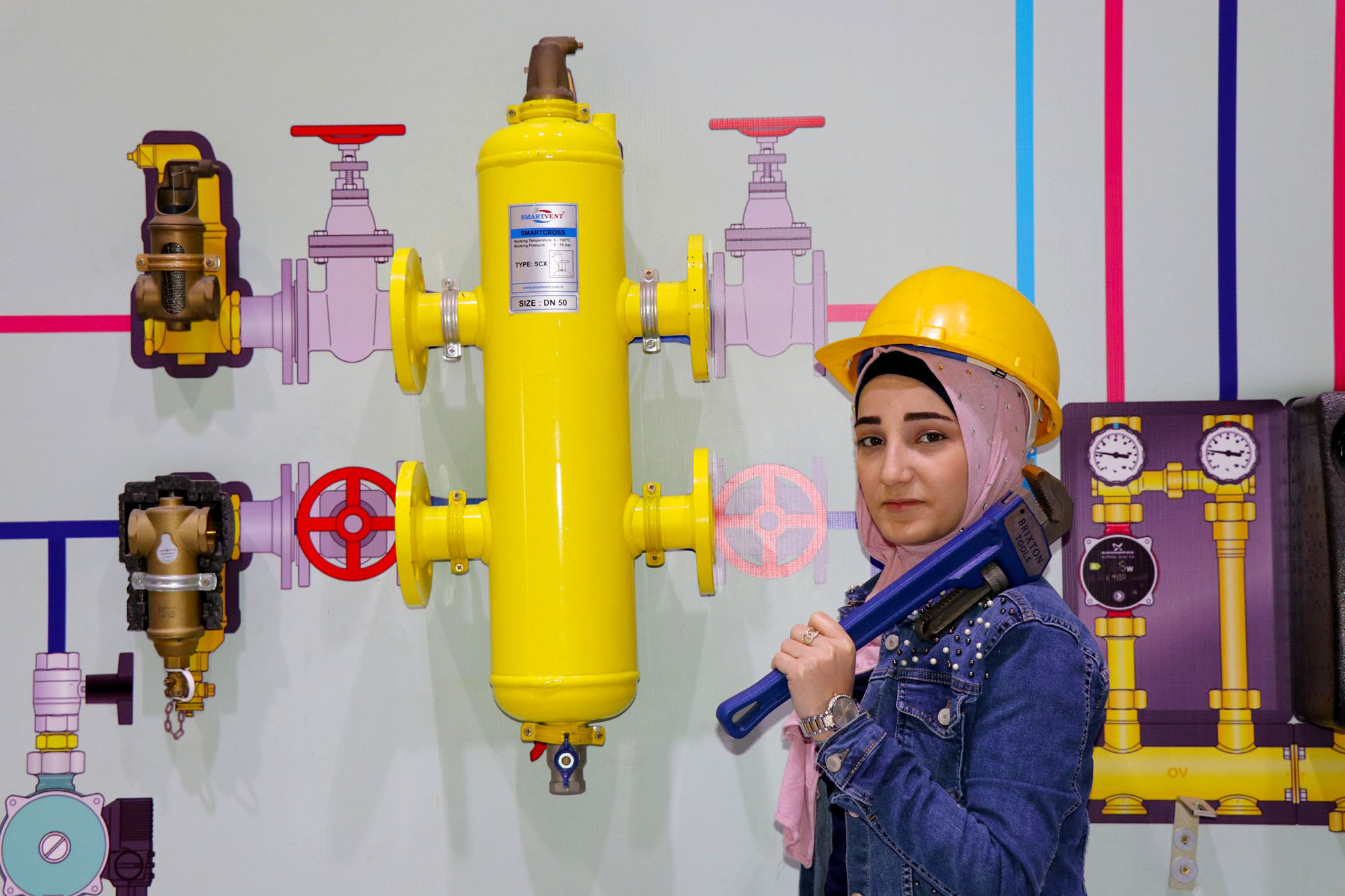

Nursing Scholarships
Due to the national shortage of qualified nursing personnel in Lebanon, Anera established a nursing scholarship fund to support Palestinian students interested in entering the profession. Through our scholarship fund, 18 Palestinian students across Lebanon, including some in the North Governorate, were able to study in accredited vocational training courses between 2015 and 2017. In order to improve their English language skills as required by major healthcare facilities, Anera-sponsored students received English courses at the American Lebanese Language Center with a success rate of 81%.
All graduates of the scholarship program are currently employed or pursuing higher degrees. Three of the nursing graduates are working at the newly established kidney dialysis unit at Safad Hospital in Beddawi Camp, after receiving intensive training at the American University of Beirut Medical Center. Anera’s nursing scholarship program opens doors to jobs that pay well and provide job security.


I love helping others. The satisfaction I feel when I can get a sick child to smile has made me realize that I was born for this job. I am a nurse by nature!
Joumana, a recipient of Anera's nursing scholarship from Beddawi refugee camp
Apprenticeships
Anera mainstreams apprenticeship as an integral part of a successful vocational training program. In providing internships and apprenticeships alongside vocational training, students have the opportunity to complement classroom instruction on theory and basic skills with hands-on experience at an actual workplace. Our vocational courses and apprenticeship programs are coupled with employment support services (cash for work), giving youth an opportunity to gain hands-on work experience, earn a daily income, and pave their professional pathways. In 2018, Anera helped 362 students in Tripoli find and receive apprenticeships.
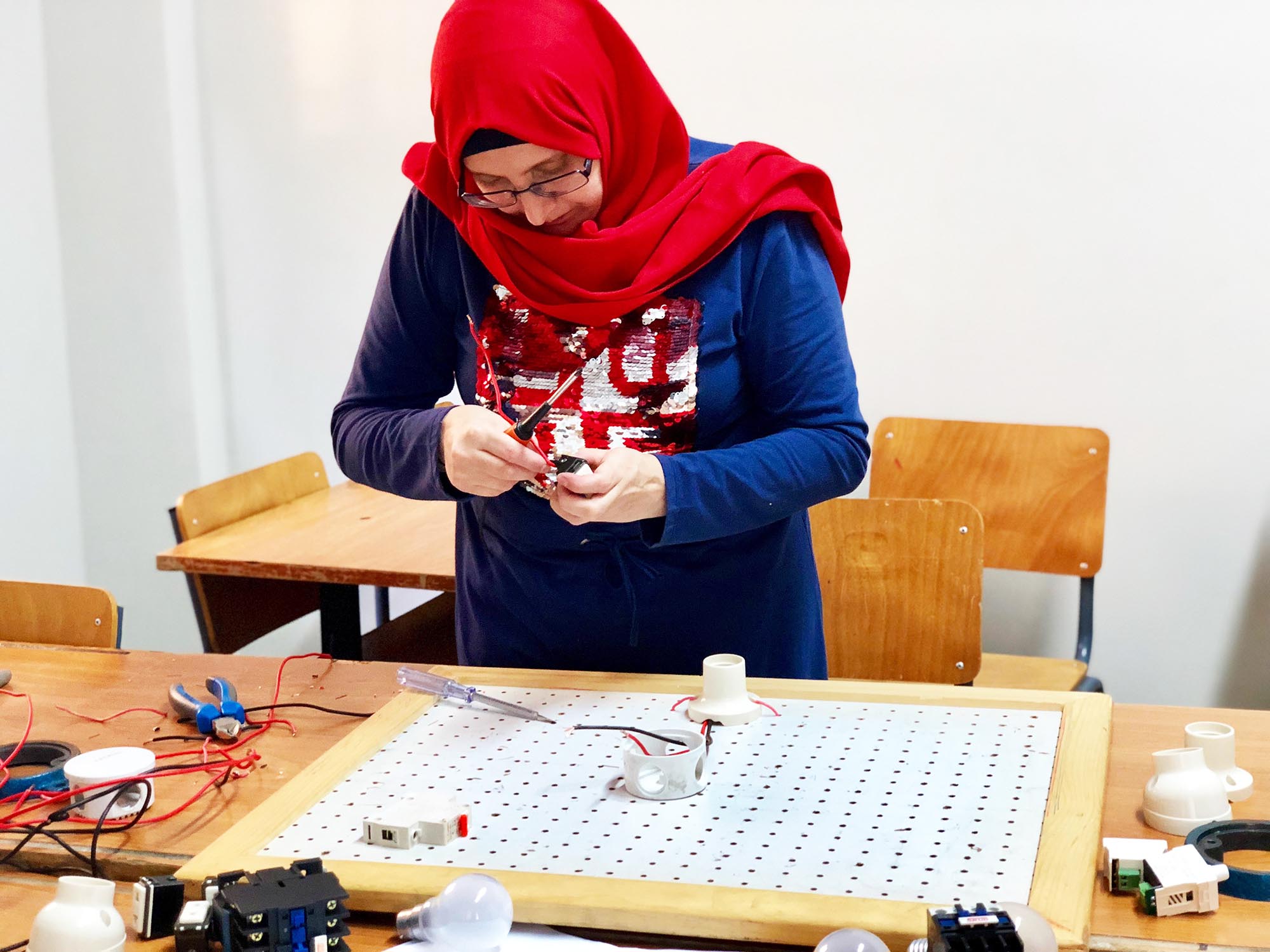

In addition to the support that Anera offers to students in the North Governorate to find apprenticeships, Anera began distributing starter kits to top students in vocational courses beginning in 2018. The starter kits include the basic tools needed for youth to begin engaging in income generating activities directly, and to practice skills acquired through the training course. Types of starter kits distributed include barber, carpentry, cooking, electricity, hairdressing, providing opportunities for youth to practice the skills learnt as well as to generate income by working as freelancers on their own time.
Education Infrastructure
More than a quarter of Syrian refugees live in northern Lebanon, where Anera has been working with dozens of local grassroots organizations to build capacity as they address refugees’ needs in education, job training and more. One of Anera’s partners is the Social Skills Rehabilitation Association, established in Bhannine in 2007. The five young women who founded it aim to promote quality education, assist people with disabilities, and improve the status of women. Their membership grew by five times in their first decade. Anera expanded their space by adding a classroom and bathroom facilities as well as painting walls, tiling the floor and installing a new roof.
In 2009, just on the outskirts of Nahr El Bared camp, Anera rehabilitated and equipped the National Association for Vocational Training and Social Services center to house vocational training programs that taught high-demand skills such as carpentry, aluminum work, nursing, child care, and automotive electronics. The center was officially inaugurated in January 2011, allowing the center to resume its 2010-2011 school year programs and host more than 150 students and 300 youths.
Before Renovations
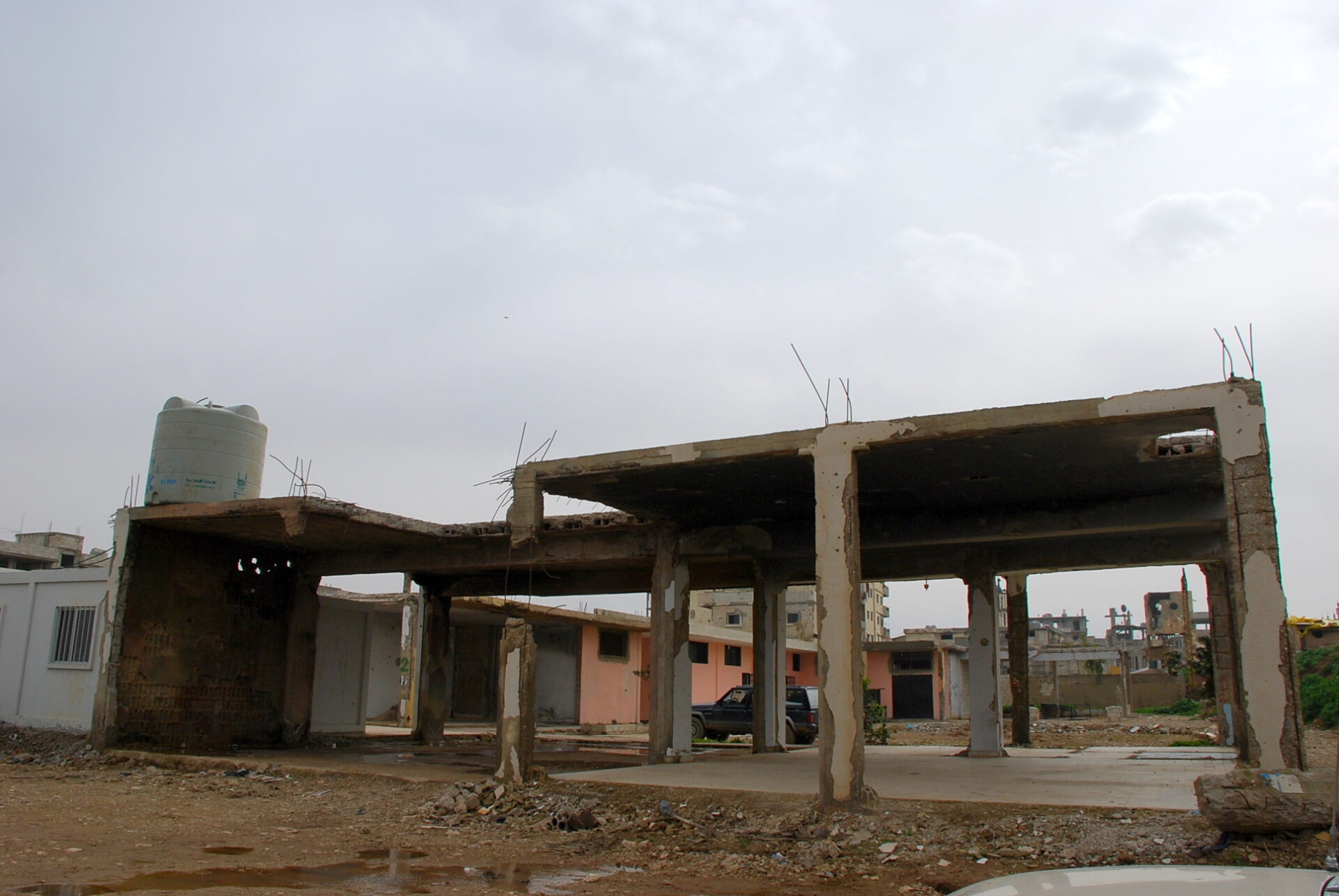

After Renovations
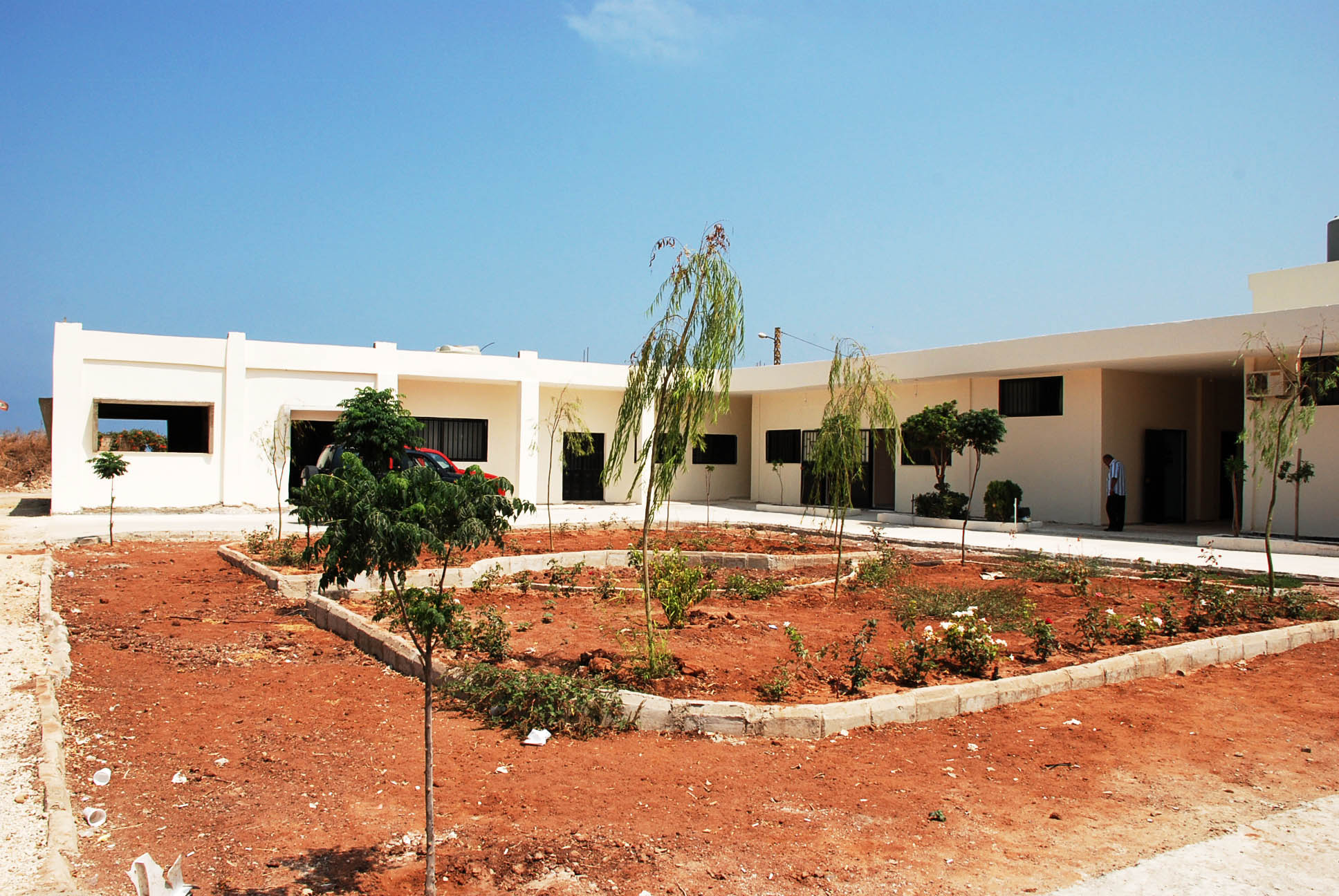

Back to School Campaign
Anera’s back-to-school projects in 2017 and 2018 recruited and trained 529 youth workers to serve as outreach volunteers and participate in community mobilization during Lebanon’s national back-to-school campaigns both years. Our volunteers fanned out across the North, Bekaa, Akkar, Baalbek, South, Beirut and Mt. Lebanon governorates. They succeeded in referring more than 19,000 out-of-school youth back into education programs, including non-formal learning opportunities. The majority (75%) of household visits took place in Palestinian camps and gatherings.
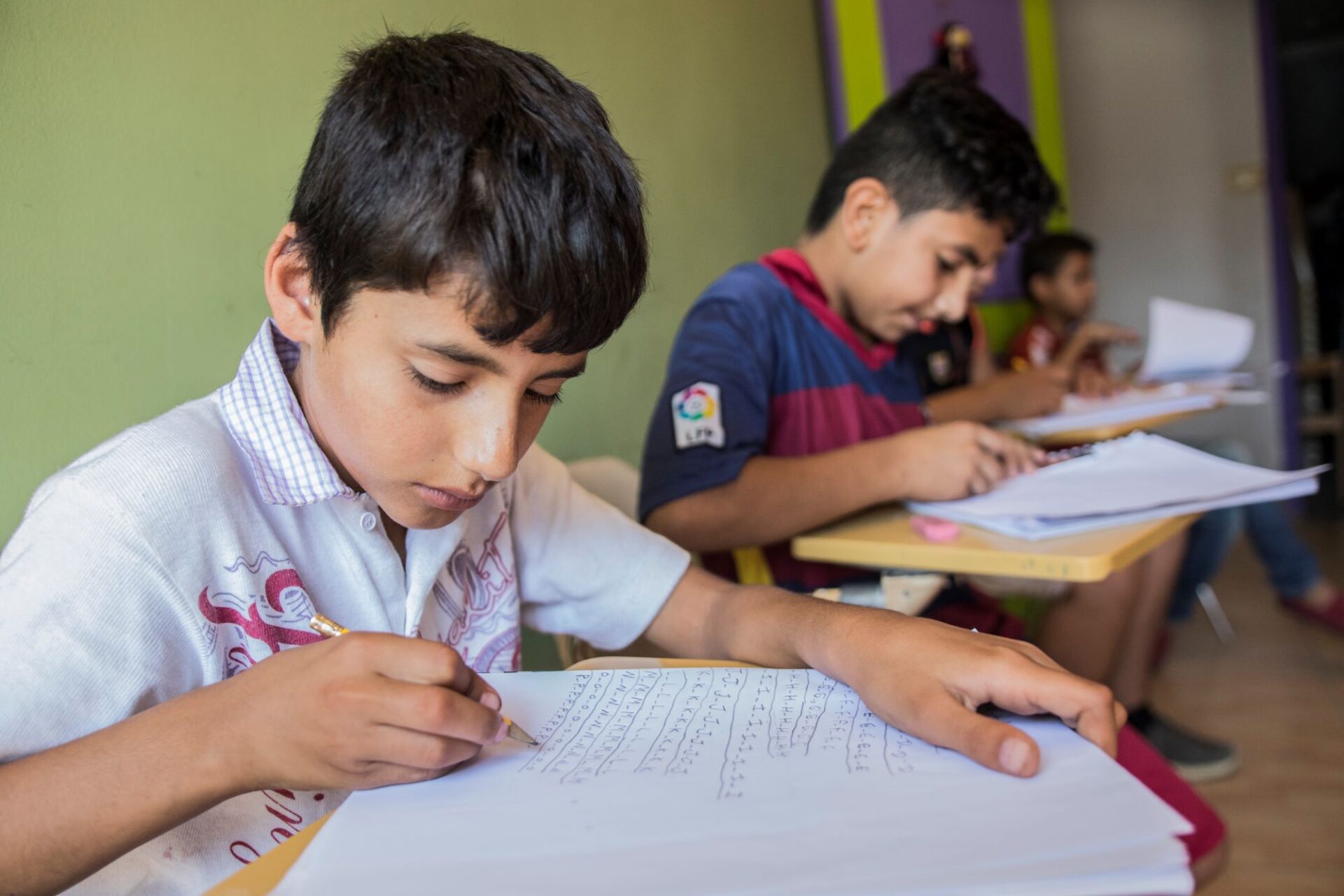

Building Livelihoods
Bolstering the Hospitality Industry
The North Governorate, with its beautiful landscapes, rich history, and bustling capital city of Tripoli, is a popular tourist destination in Lebanon. Small cottage inns and bed-and-breakfasts offer lodging options throughout the area, but owners – in many cases families – often struggle to keep up with current trends in marketing and providing top-quality service to their guests. Most owners, managers and employees lack hospitality and management skills in the day-to-day routine of innkeeping. These obstacles prevent the tourism industry from flourishing.
To address these issues, Anera embarked on a project aimed at developing the hospitality industry in Lebanon in 2005. The project had the goal of fostering economic expansion while creating sustainable employment opportunities in rural areas. We developed the program in two phases. Firstly, Anera worked with the owners of cottage inns to develop their plans to improve their facilities and to better meet the needs of potential clients. Secondly, we provided institutional training focusing on technical skills related to the day-to-day management of services. This included projects like the development of owner manuals and financial consultations.
We also offered comprehensive trainings to others in the hospitality industry such as food providers and tour guides. A major focus was increasing the number of qualified persons engaged in the tourism workforce. Anera established a placement services office, procured vans for transporting students to trainings, and rehabilitated and refurbished a catering school. We also helped improve the promotion and marketing of cottage inns, aiming to attract tourists and customers who would spend money in the rural communities.
Over the course of 5 years, our hospitality program assisted 10 guesthouses, hotels, and inns in the towns of Tripoli, Becharreh, Bazoun, Sir El Donnieh, El- Qmemine, Enfe, and Tannourin, in addition to developing the tourism industry on a wider scale.
Agriculture
Community Garden
In the early 2010s, Anera worked with a home for the elderly in Nahr El Bared to create a community garden at their facility. Anera brought agricultural experts to the camp to provide the residents with training in urban agriculture and irrigation techniques. Vegetables, herbs and even fruit trees provide residents with food security and tending the garden offers elderly residents an engaging pastime.
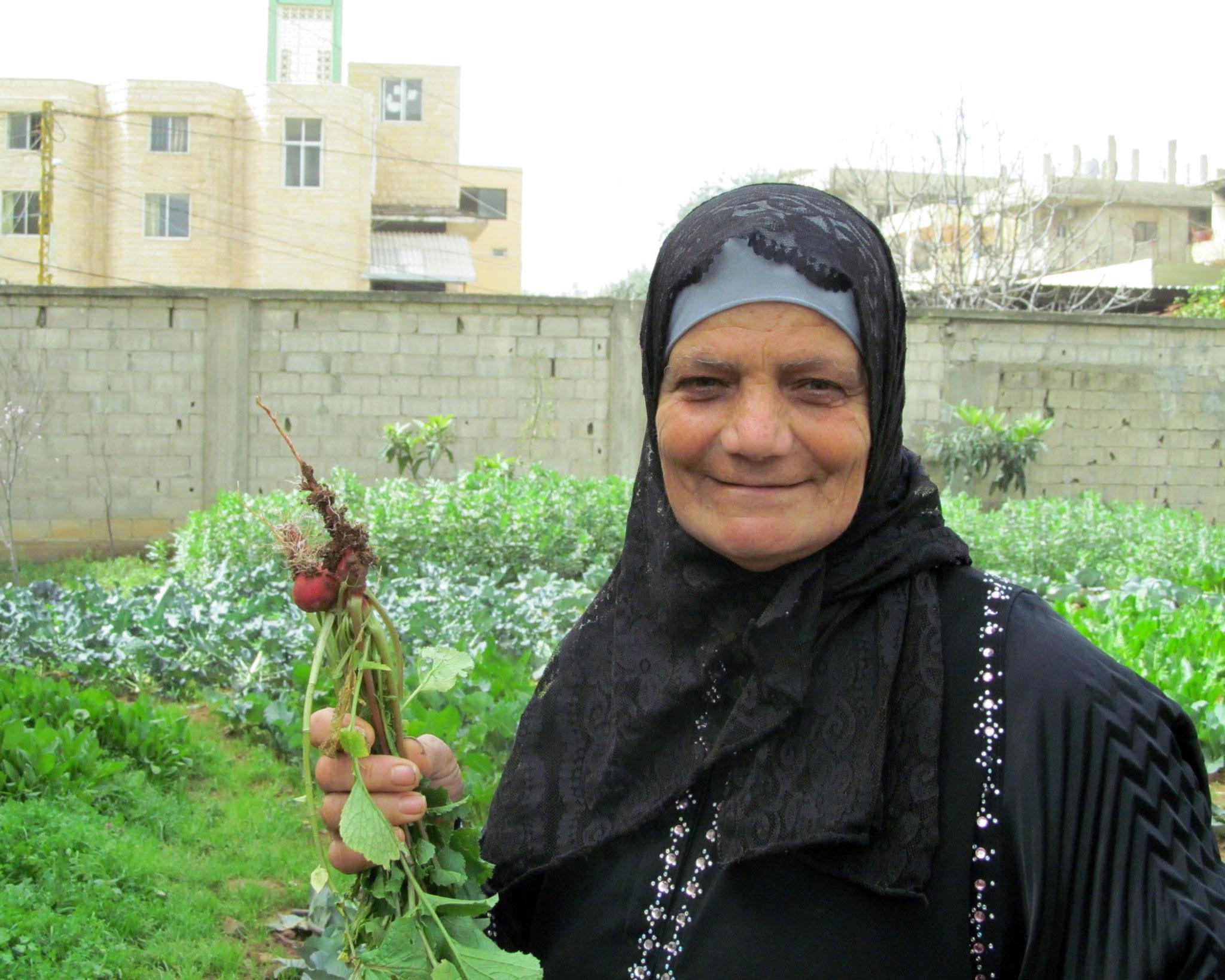

Green Spaces and Rooftop Gardens
Anera embarked on a campaign in 2013 to restore green spaces and install rooftop gardens in Nahr El Bared the camp. The rooftop gardens help families who have space they are otherwise not using to grow prolific crops of vegetables, fruits, and herbs, providing a food source as well as a sense of community. By 2013, we had installed 121 rooftop gardens, cultivating plants in coordination with family preference. Anera also took into account the type of soil and space available, and the plants were mostly consumable. The project had multiple elements: getting the community engaged and participating in the process of planting their own gardens, promoting a positive aesthetic atmosphere in the camps, and supporting households in cultivating part of their own food consumption.
According to a survey of some of the owners of home gardens in Nahr El Bared, more than 86% of participants responded that their garden was “extremely important” to their family. Due to the success of the project, Anera has continued to plant rooftop gardens in Nahr El Bared. In 2022, we installed 50 rooftop gardens, and provided tools and professional training.
Health
Medical Relief
Since the influx of refugees from the Syrian civil war and Lebanon’s economic collapse in 2019, the North Governorate’s need for medical aid has only increased. This need for medical aid has led to medical relief efforts being one of our most expansive and long-term projects in the governorate. Since 2006, Anera has provided medical supplies and pharmaceuticals to hospitals and clinics to treat vulnerable patients. Our shipments are delivered throughout the governorate, reaching both large hospitals such as Tripoli Public Hospital as well as smaller community clinics such as the Medical and Social Center in the district of Koura. Delivering shipments ranging from chronic disease medicines to antibiotics and general hospital supplies, Anera donates between $8 and $13 million worth of supplies and medications, reaching thousands of patients annually. We deliver the medical aid directly to our local partners for distribution, with extensive monitoring and reporting to ensure standards are maintained.
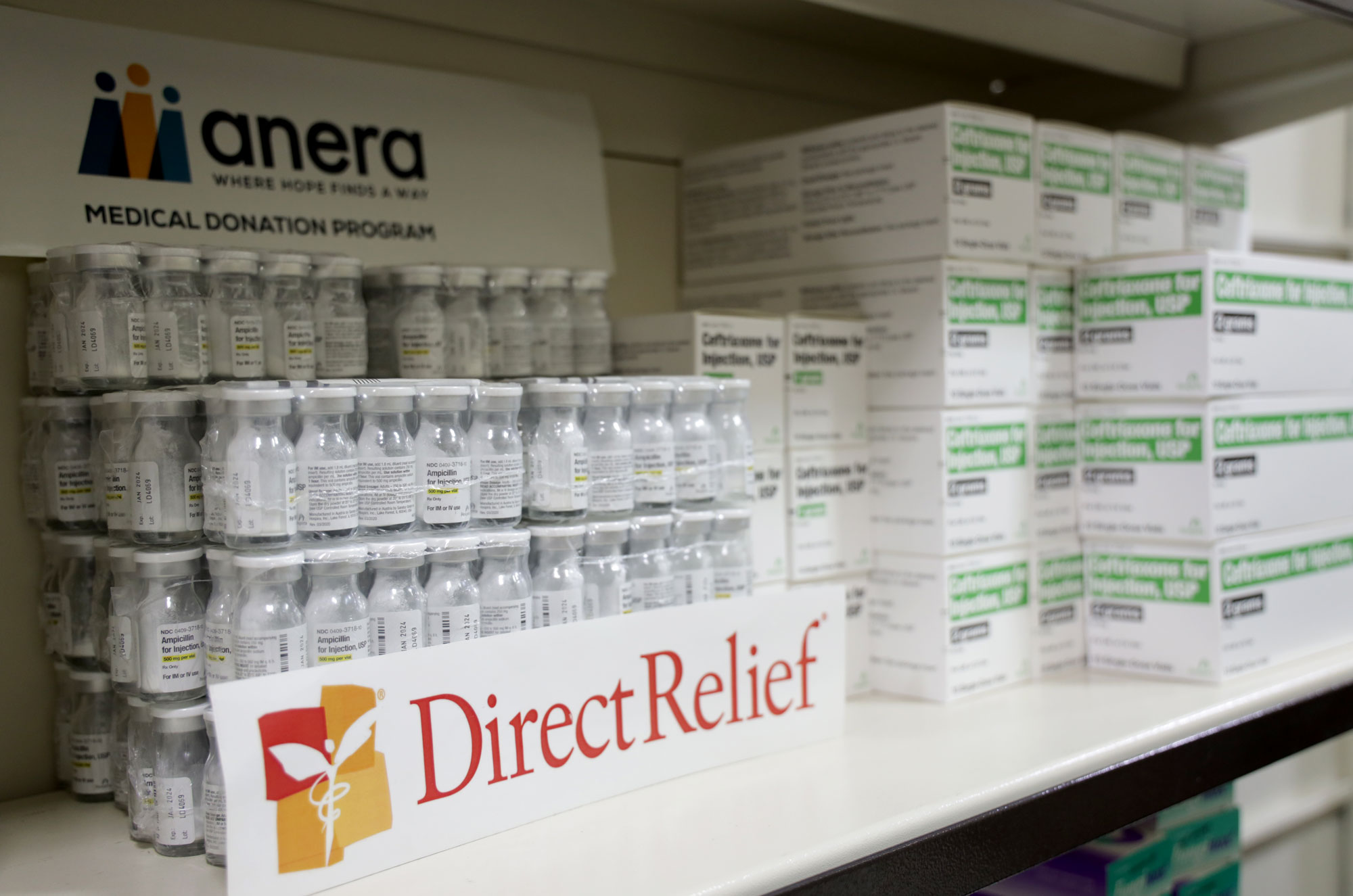

Many of the donations target vulnerable Syrian and Palestinian refugees living in the North Governorate. For example, in 2019, Anera delivered 5.3 million treatments of chronic illness medication to Palestinian and Syrian refugees through primary healthcare centers, clinics, and hospitals. Nearly 50,000 patients benefited, receiving treatment for illnesses such as diabetes and Alzheimer’s.
In 2023, Anera was able to provide 9,200 treatments of more than five types of anticancer medications, estimated to treat around 3,000 patients. We distributed the shipment to public hospitals with chemotherapy units, including the Karantina Public Hospital in Beirut, the Tripoli Public Hospital in the North.
The program continues today as a vital aspect of Anera’s work in the North Governorate, providing patients in need with the medications necessary for their health and well-being and ensuring hospitals and clinics have the resources to provide quality healthcare.
Kidney Dialysis Unit
In 2017, Anera installed a kidney dialysis unit at Safad Hospital in Beddawi refugee camp. Prior to this new installation, there was only one kidney dialysis unit available to Palestinian refugees in Lebanon, located at Al Hamshari Hospital in Sidon, South Lebanon. For the residents of the seven Palestinian refugee camps that are not located near Al Hamshari, paying a visit to this unit required a long day of traveling, harsh physical demands and financial resources for transportation. According to the World Health Organization, it is recommended that kidney dialysis patients spend at least 12 hours a week on the machine. The newly established unit allows for Palestinian refugees in the North to have easier access to this life-saving medical treatment and increases their ability to receive the amount necessary for their health. The unit includes seven kidney dialysis machines that function on a two-shift basis to be able to serve all patients, and staffs two doctors, five nurses, a secretary, and a logistics officer.
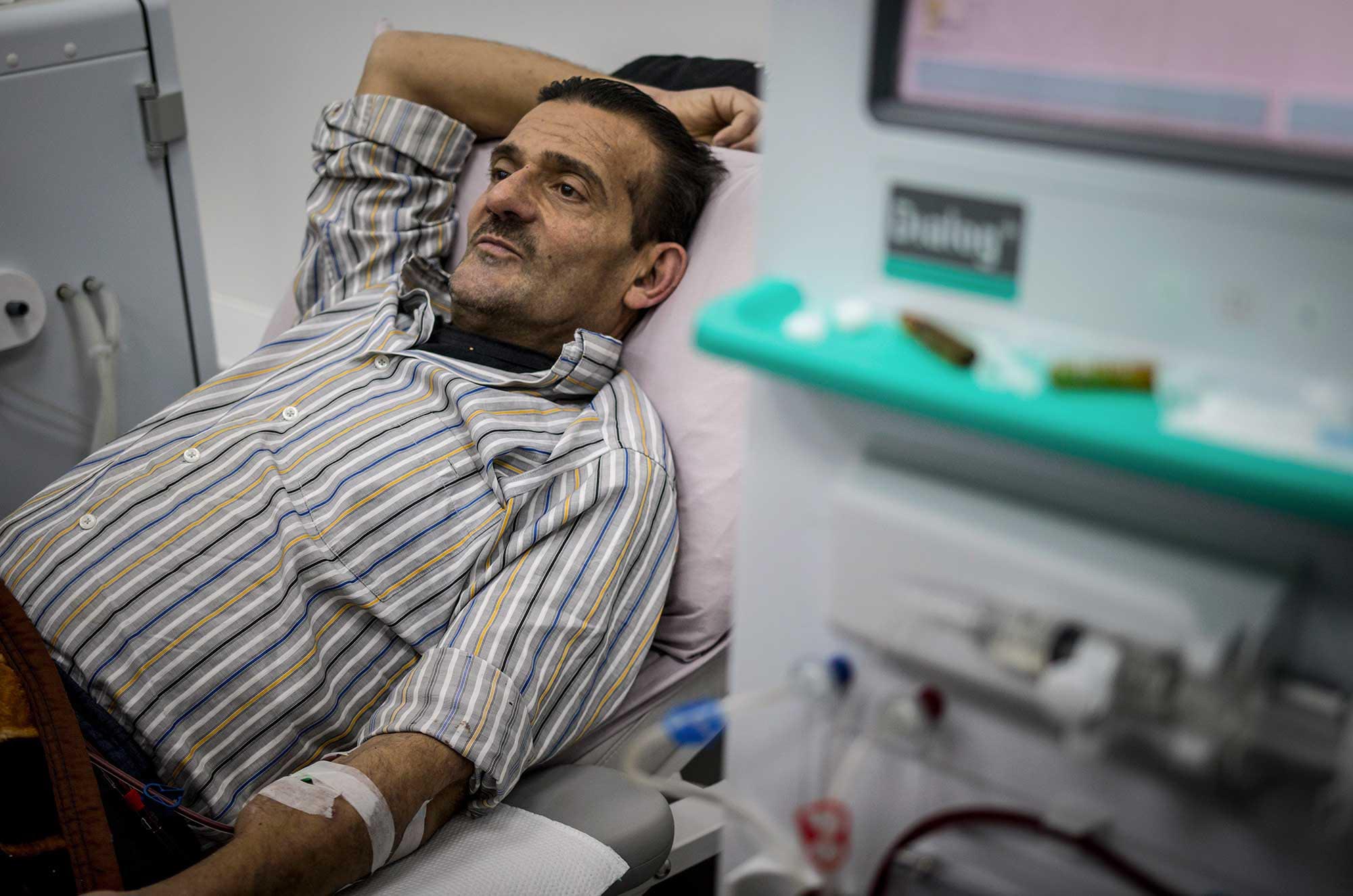

Creative Health Campaign
In addition to providing medications and healthcare supplies, Anera also focuses on promoting health education. From 2007 to 2011, Anera’s Creative Health Campaign promoted simple, cost-effective, good health practices that people living in marginalized and poor communities could do to improve their health and foster self-reliance. Our topics were doable within societal constraints and included breastfeeding, nutrition for age two and under, good eating habits, exercise, cancer prevention and anti-smoking.
To promote these best practices, Anera built networks to foster cooperation between and among Palestinian and Lebanese nonprofits. The program organized community-based actions using creative approaches, such as women’s support groups, festive health events and interactive theater. We also produced an array of educational materials to use in capacity-building events, face-to-face education and community actions.
With limited resources, the campaign effectively scaled up to reach hundreds of community health workers and tens of thousands of community members living in marginalized communities in Lebanon. In 2009, the campaign reached nearly 10,000 people in 37 festivals and events held around the country. In addition, Anera reached thousands more through the distribution of more than 300,000 posters, stickers, games, calendars and other printed educational materials. The initiative provided five years of comprehensive health education through community outreach in the North Governorate.
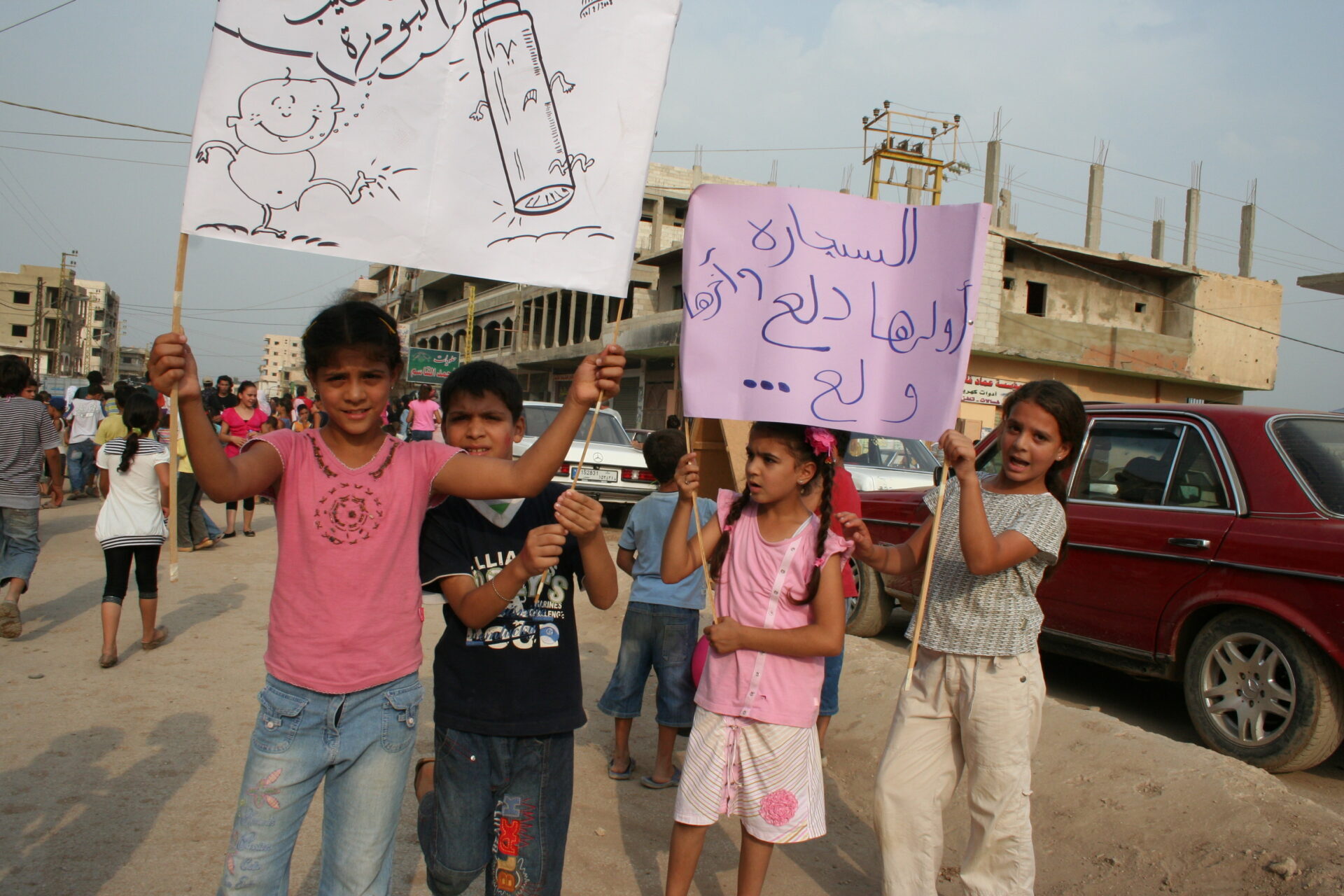

Menstrual Hygiene Awareness
Lebanon is experiencing a public health crisis that has resulted in a shortage of medicines and medical supplies. A lack of menstrual health products has pushed women and girls to resort to unhealthy practices, such as using newspapers, tissues, rags or the same disposable pad for days on end. Lebanon’s economic crisis has exacerbated the problem, especially in the impoverished and over-crowded Palestinian refugee camps.
To address this issue, Anera’s public health team organized a series of menstrual hygiene activities. Anera held awareness sessions in schools in refugee camps throughout Lebanon, including Nahr El Bared and Beddawi.
The program included information and awareness sessions for girls, aged 12-16, and the distribution of My Body-My Health information kits to 3,000 girls. The kits were donated by the German Development Bank KfW. Anera’s trained youth-and-hygiene-promotion daily workers provided instruction on time management, good hygiene practices, pain management, healthy diets and general well-being.
Lice and Scabies Awareness
The overcrowding of refugee camps leads to an increased risk of the spread of many diseases and infection. In 2013, body lice and scabies infestations were reported on the rise in refugee camps in Lebanon, especially among school children, with serious health and social consequences. Beginning in September of the same year, Anera implemented an eight-month project of lice and scabies awareness and treatment in schools and preschools in Palestinian refugee camps throughout Lebanon.
At Nahr El Bared and Beddawi camps, Anera provided training for health educators and staff at schools and preschools on lice and scabies detection and treatment and how to dispel myths and misconceptions about lice and scabies infestations. The trained staff then performed regular screenings for children in the schools, providing treatment for confirmed cases and holding workshops for parents. Anera also published and distributed thousands of copies of a family guide on lice and scabies with step-by step instructions for screening and treatment.
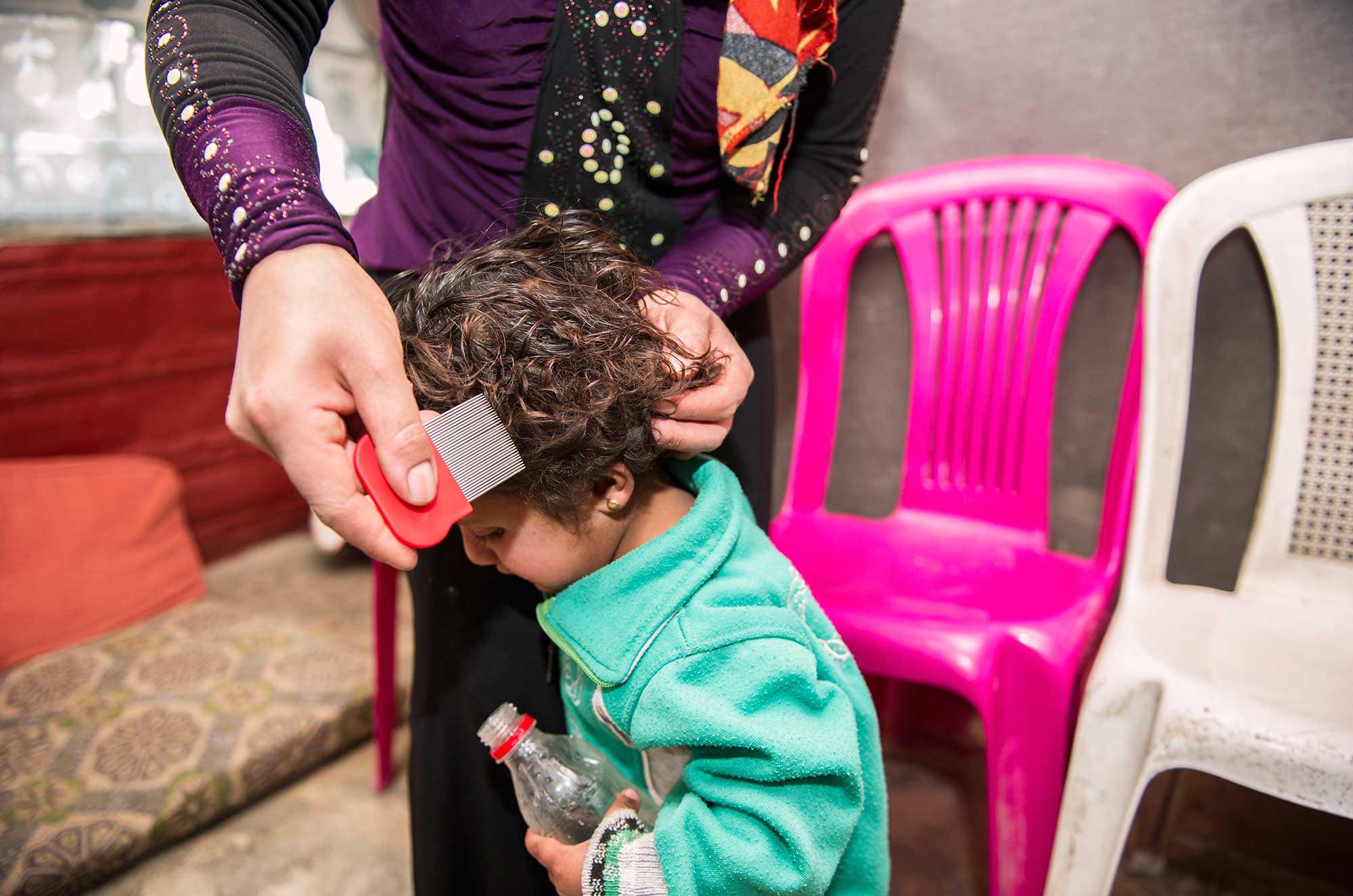

Water, Sanitation, and Electricity
Waste Management
In Nahr El Bared refugee camp, trash used to be dumped everywhere, filling the streets and covering sports fields, which posed a significant health risk for the 30,000 Palestinian refugees living there. To address the issue, in 2016 Anera initiated a waste management project that included a community-based intervention, where the youth of Nahr El Bared contributed to the clean up of the camp. We created a “model neighborhood” of 350 households, mobilizing the residents to sort waste at home and then donate sorted materials to local recyclers. Volunteers distributed two different bins to each home, along with trash bags, to incentivize community members to participate.
The effort continued to expand until the end of the project in 2018. Thousands more households received waste sorting bins and participated in targeted trainings and awareness activities. We also provided capacity-building training on solid waste management, in addition to protective equipment for safe waste handling. Sixty trained youth volunteers from the local community conducted regular door-to-door visits to monitor project success and help guide families on proper household waste sorting. Monitoring results revealed that the overwhelming majority of households adopted sorting practices, with 75% properly sorting waste.
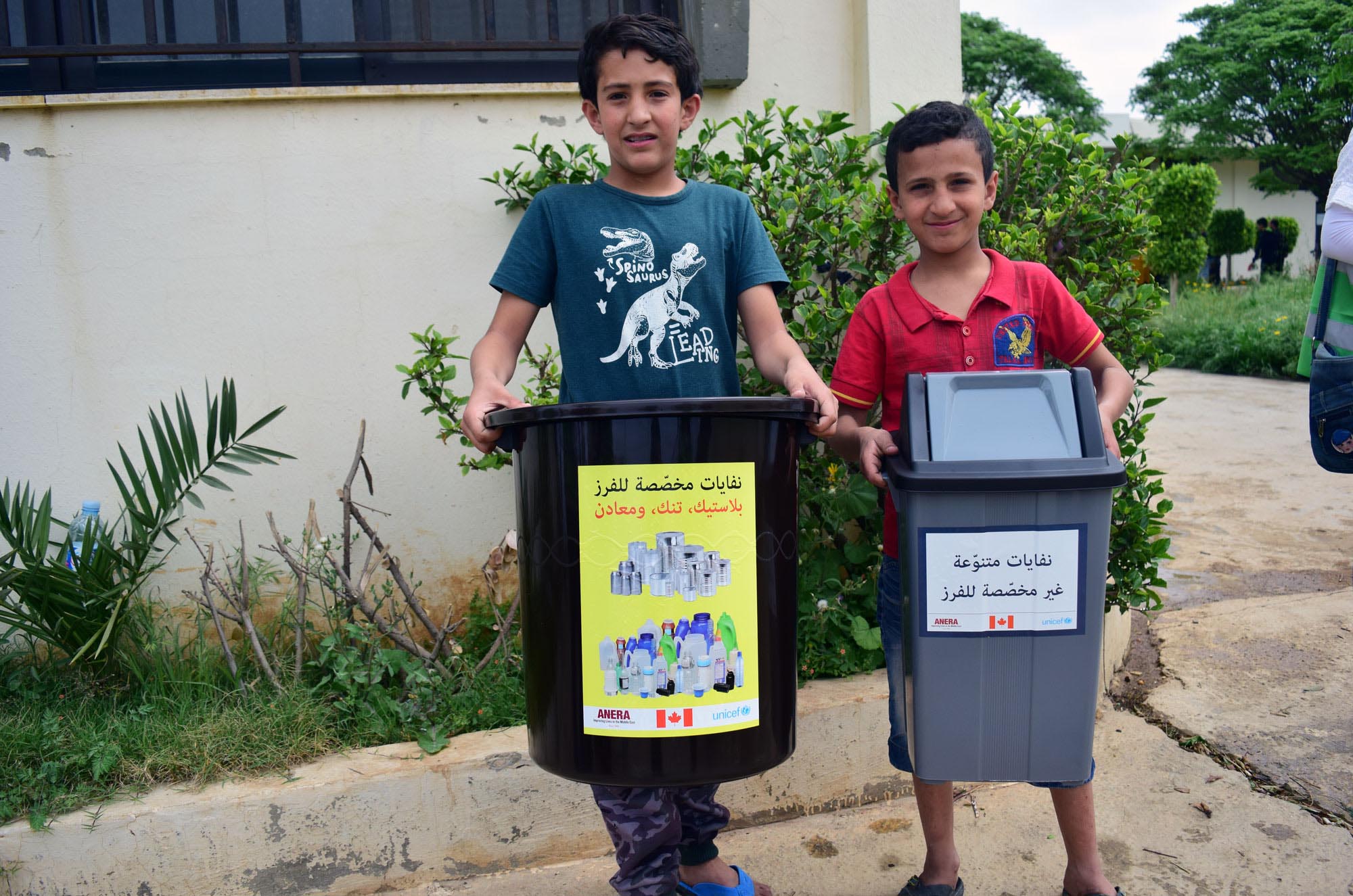

Water Tanks
Anera first extended its services to Nahr El Bared in 2007 following clashes that erupted between armed groups and the Lebanese Army, displacing 27,000 Palestinian residents to neighboring camps and villages. In the years that followed, we helped the camp in myriad ways. One intervention was to provide affected families with water. Anera installed 200 water tanks on apartment buildings in the Palestinian camp. The water tanks ensured thousands of people had a safe, dependable source of water in their homes.
Solar Panels
The energy crisis has been a long-standing issue in Lebanon, dating back to the civil war. Exacerbated by the 2019 economic collapse, electricity shortages have gravely impacted the country's economy and essential services. With generous support from a private donor, Anera has taken action to address this issue by installing 219 solar energy panels, 14 power inverters, and 24 lithium batteries at 14 community and health centers across the country, including the Women's Programs Association center in Beddawi. This project has social, organizational and environmental benefits, allowing centers to focus on providing their services in an environmentally sustainable way without worrying about lack of electricity.
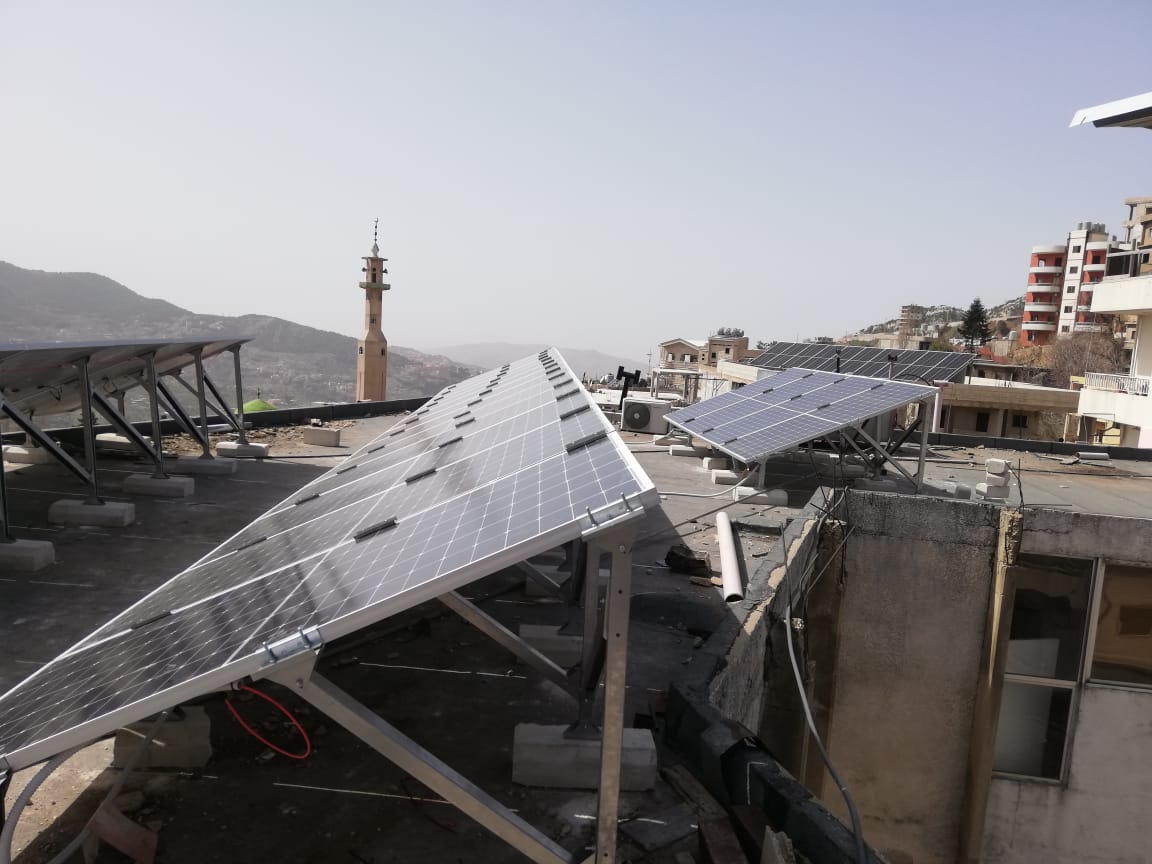

Community
Community Centers
In 2008, Anera restored the Beit Atfal Assumoud community center in Nahr El Bared. The center provides a place for community members to congregate and learn. After the fighting in Nahr El Bared in 2007, the center was heavily damaged, with its computers, dental and educational equipment, electrical installations, furniture and generators either looted or burned. The structure, however, was sound enough for the facility to be rehabilitated.
Through the support of private donors, Anera was able to rehabilitate the community center. Beit Atfal Assumoud now houses a preschool, an afterschool reading room, and a vocational training lab, providing a safe space and improved facilities for the community to come together. The reopening of the center, the first such community-geared facility to be rehabilitated in the camp, served as a milestone for the families who had returned and were still struggling to rebuild their homes and lives some year and a half after the end of the fighting.
Playgrounds and Sports Fields
In the concrete labyrinths of the 70+ year old Palestinian refugee camps in Lebanon, spaces for sports and fun are in short supply. So, Anera renovates and upgrades what is there, whether it's a community sports facility and field or a playground attached to a school. In Nahr El Bared, Anera inaugurated the Mazen Afifi Playground in 2009. The area included a sports field as well. Our renovations involved installing new playground equipment, adding sand and soil to the area, weeding and planting up the playground’s garden, repainting the fence, and installing a generator for consistent water supply.


“My late husband, Mazen, had a strong desire to improve the lives of the children in the refugee camps in some way. My son and I felt a playground in his honor was the perfect tribute to him — and thanks to Anera’s support and hard work, we were able to make it happen.”
Anera donor, Mary Lou Afifi
In 2012 and 2018, Anera renovated major sports facilities in Beddawi and Nahr El Bared respectively. Anera completely renovated the soccer fields, from the pitch and spectator stands to the locker rooms and indoor sports venues. Anera also installed a professional lighting system on the field to extend hours for training after dark. At the Beddawi facility, we made space and added a new playground. The playfield in Nahr El Bared benefits more than 300 soccer players and18 sports clubs, and is the only field that is free of charge for sports clubs to train and play. The sports centers provide a valuable space for youth to engage in organized sports – especially soccer.
To help manage the fields and facilities, two sports committees composed of representatives from Beddawi and Nahr El Bared sports clubs were established and tasked with the responsibility.
Sports for Peace
Sports clubs and programs are a valuable way to build community, foster relationships, and teach youth about healthy lifestyles. Following the Syrian refugee crisis, Anera expanded its programs to respond to the need for comprehensive and inclusive sports-based programming for all vulnerable youth residing in Lebanon. This includes poor Lebanese, Syrian refugees, Palestinian-Syrians and Palestinians. Programs engage refugee youth by focusing on sports-based capacity-building, peace-building, life skills development, and mentorship.
The programs not only provide a place for youth to play and connect, but also to focus on learning. Anera implemented "health days,” which help to correct health misconceptions and enhance participants’ general knowledge and interests for a healthier lifestyle. Through sports-based learning activities, youth are able to learn about healthy habits and lifestyles, such as the importance of physical activity and the dangers of drug and tobacco use.
By 2018, we reached more than 33,000 vulnerable children throughout Lebanon through our sports-based programming, with many residing near or within Nahr El Bared and Beddawi refugee camps.
Though no longer run by Anera, the sports programs continue today through Anera’s partners, delivering valuable life skills and health education to vulnerable youth through sports activities.
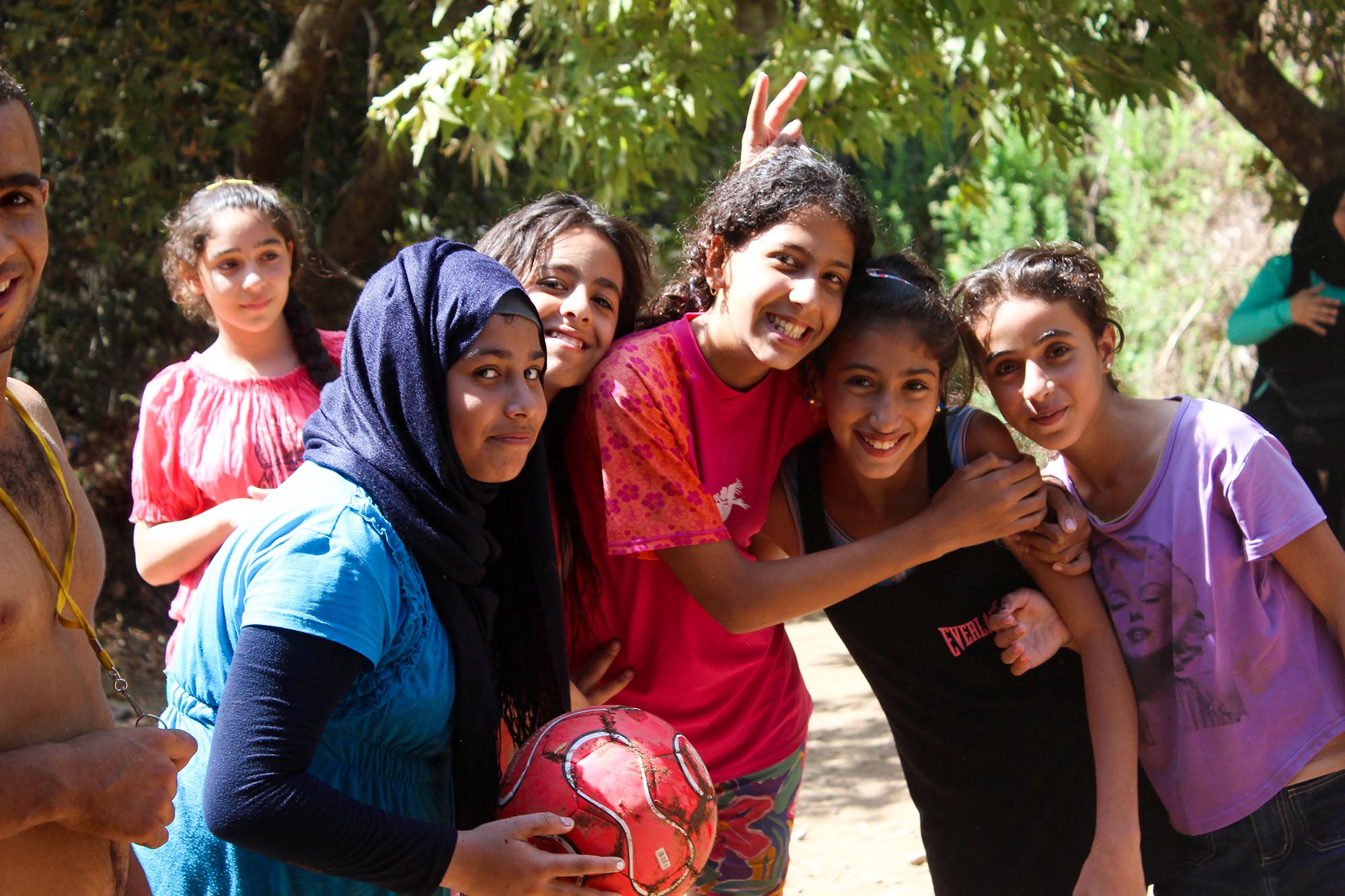

Training for Coaches and Youth
In order to effectively implement sports programs in the North Governorate, Anera trained sports coaches, empowering them to become role models, mentors, and actors of social change. In 2016, we launched several life skills and technical training sessions in the Nahr El Bared and Beddawi camps, which reached 80 football coaches. The trainings focused on life skills such as conflict resolution, communication, and team-building as well as first aid and personal development. By training coaches to become agents of change in their own communities, they are better able to transmit their learnt life skills to the youth they work with.
We also facilitated first-aid education, providing skills-based training for coaches and sports clubs on how to handle injuries on the field. In 2013, we trained 5 sports clubs from the area surrounding Nahr El Bared and 17 from within the camp on sports injuries and prevention, commencing the training with thematic tournaments that promote youth healthy lifestyles. All 22 sports clubs that participated in the first aid training program reported having acquired new and essential skills on how to handle injuries in the field. Most importantly, they learned how to handle specific and recurrent injuries that might happen during training such as spasms, contusions, sprains or fractures.
In addition to providing training for coaches, Anera implemented sports-learning sessions for youth. We introduced new types of sports and offered new experiences to approximately 2,000 youth who had limited or no prior access to sports. The sessions aimed to ensure that all youth have an equal opportunity to explore or practice their preferred sport while receiving informed coaching.
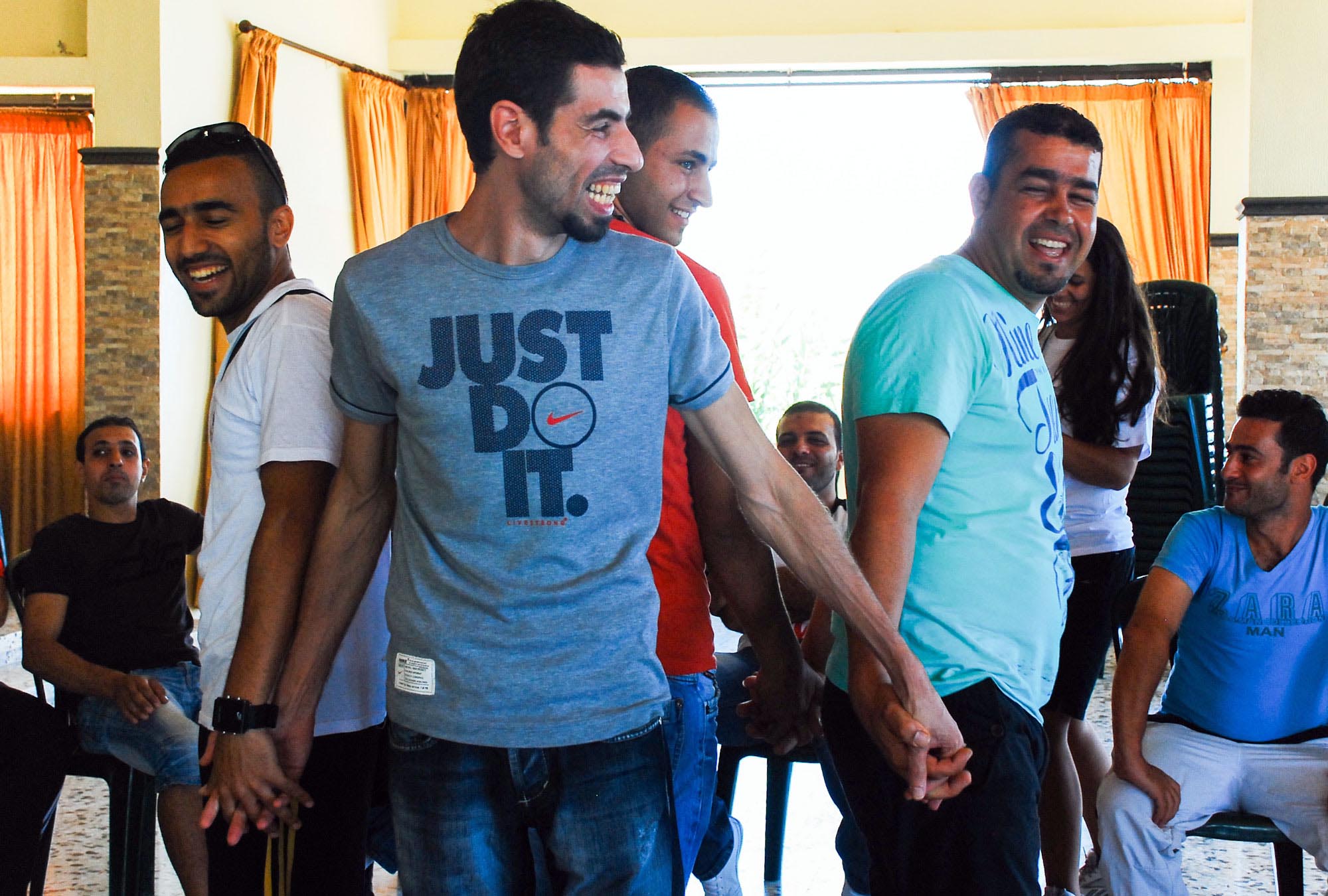

Humanitarian Aid
Food Parcels
During Ramadan, nightly iftar meals are essential to sustain families breaking their daily fasts. However, many experience food insecurity due to economic hardships, making the iftar meals difficult to provide. To help ease the burden of purchasing meals during Ramadan, Anera distributes food parcels in Lebanon to vulnerable families. Each year since the initiative began in 2016, Anera has delivered thousands of food parcels throughout Lebanon, with hundreds reaching families in the North Governorate refugee camps of Beddawi and Nahr El Bared. In 2021, we delivered food parcels to 10,000 families throughout the North Lebanon and Akkar governorates, serving 50,000 individuals total. The parcels include a wide variety of items in the parcels, with the one-month supply of food guaranteeing food security for the families throughout Ramadan and allowing them to put their income towards other necessities.
The program continues today, providing individuals and families with much needed food assistance during the holy month.
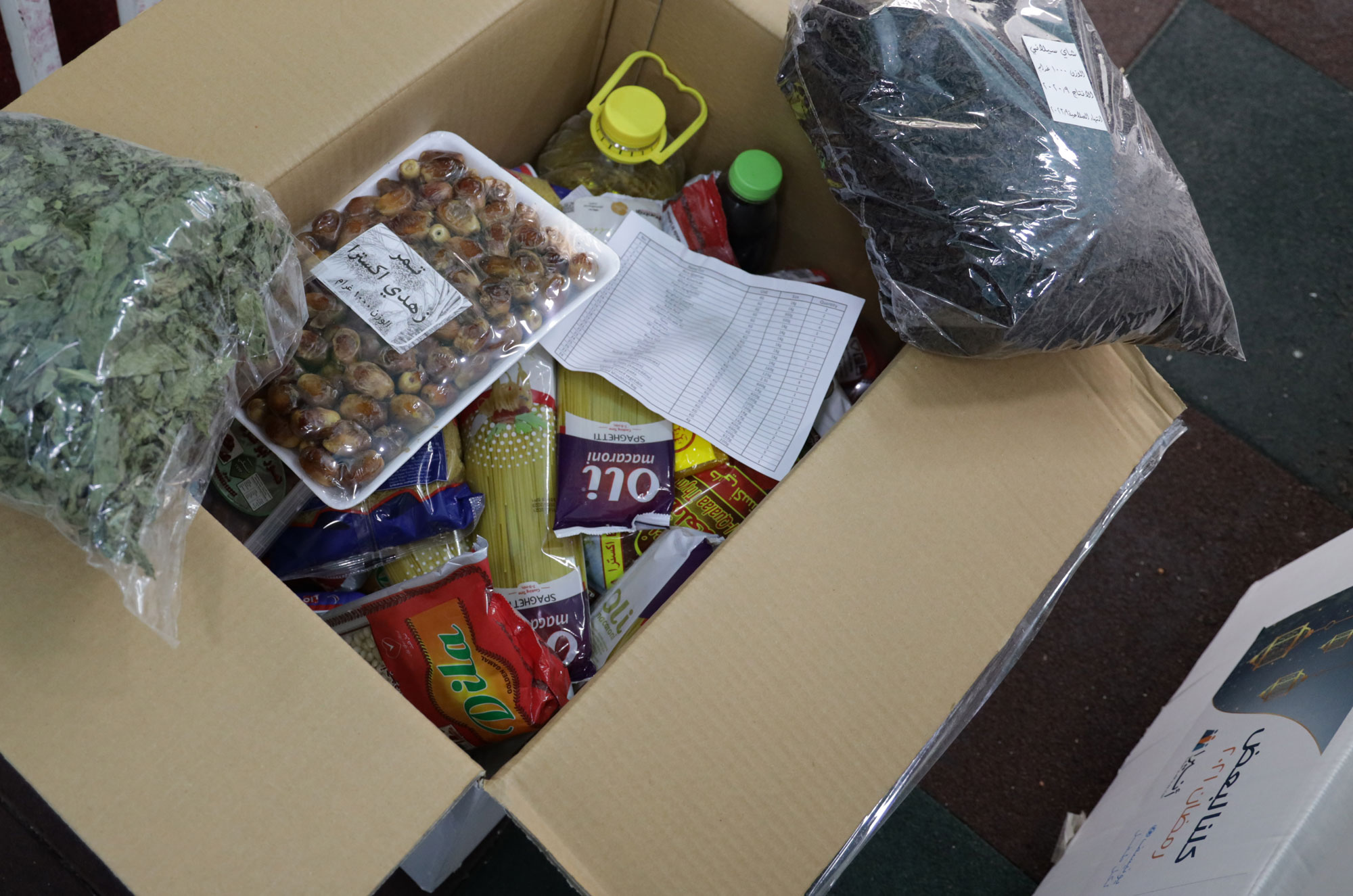

Winterization
In North Lebanon, winters can be harsh. For those without proper shelter and equipment to weather the conditions, the winter season can be a dangerous time. In the winter of 2014-2015, Anera implemented a winterization project in the Nahr El Bared and Beddawi refugee camps. The project provided winterization packages to families with included necessities such as winter blankets, mats, emergency lights, and children’s kits with warm clothes and boots. We reached more than 1,000 families in each camp, many of whom had one member living with a disability.
Material Assistance
Since 2013, Anera has delivered a wide range of much-needed material items, such as shoes, hygiene kits, quilts, and school products. In 2019, we delivered almost 96,000 pairs of TOMS Shoes to preschool children in Palestinian refugee camps, including in Nahr El Bared and Beddawi. Also in 2019, we distributed 22,000 hygiene kits, school products and quilts to more than 9,000 children and youth enrolled in our basic math and literacy and vocational classes. These kits relieved parents from having to buy these necessary items, therefore freeing up funds for other important things.
Cash Assistance
Anera’s cash assistance program is an ideal way to provide relief, helping families ease the burden of debt through monthly cash allowances. In 2019, Anera implemented the cash assistance project, which provided monthly assistance to 250 of the poorest households living in the North Governorate’s regional capital of Tripoli. The project covered the city’s neighborhoods of Qobbe, Tabbaneh, Abou Samra, Beb Ramel, Al Zahrieh, Mankoubin, Khan Tamasili and Hay El Tanak.
The average household size of the 250 selected families was seven members, allowing the assistance to reach about 1,750 vulnerable people total. In line with the standard value set by the cash assistance consortium in Lebanon, we disbursed allowances of $174 each to beneficiary households.
Due to the overwhelmingly positive feedback from the first cash assistance initiative, Anera provided the assistance again in 2020 to 140 households in Tripoli. More than 70% of the families reported that the cash assistance helped them pay back part of their debts, with 68% reporting that they were able now to buy food items they were not able to afford before.
In the early 2010s, Anera began delivering food and making cash transfers, in five rounds each over the course of ten months, to 1,070 food insecure households. Anera did not work alone but rather engaged with grassroots organizations to oversee distribution and make sure no family in need was left behind. Partners included the Social Skills Association in Bhannine and the Thinking About Others Association in Tripoli.

